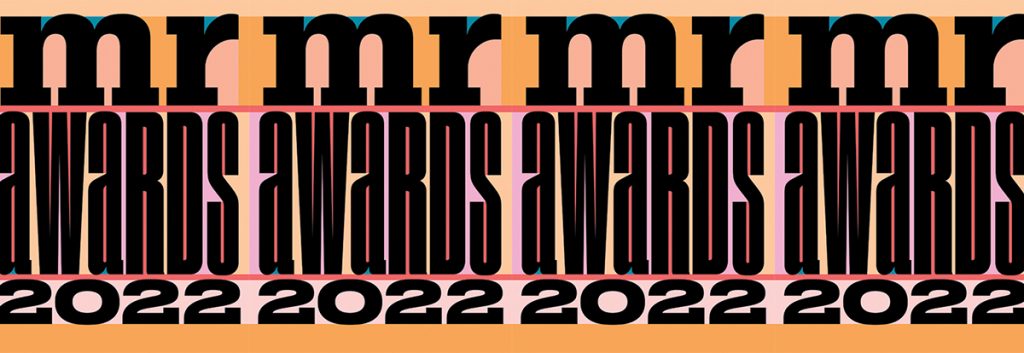MR AWARDS 2022 BRAND BUILDER OF THE YEAR JAMIE SALTER AUTHENTIC BRANDS GROUP
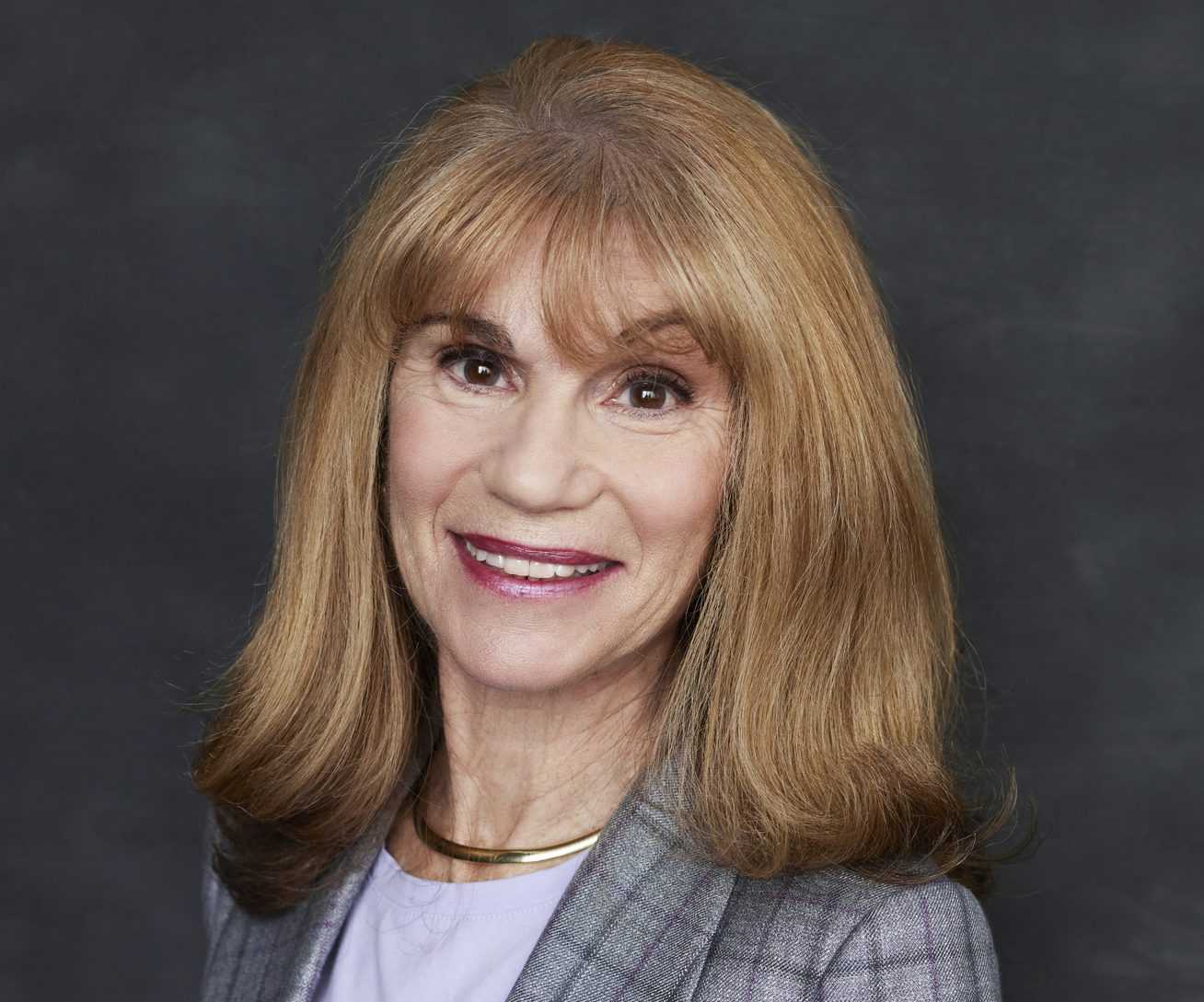
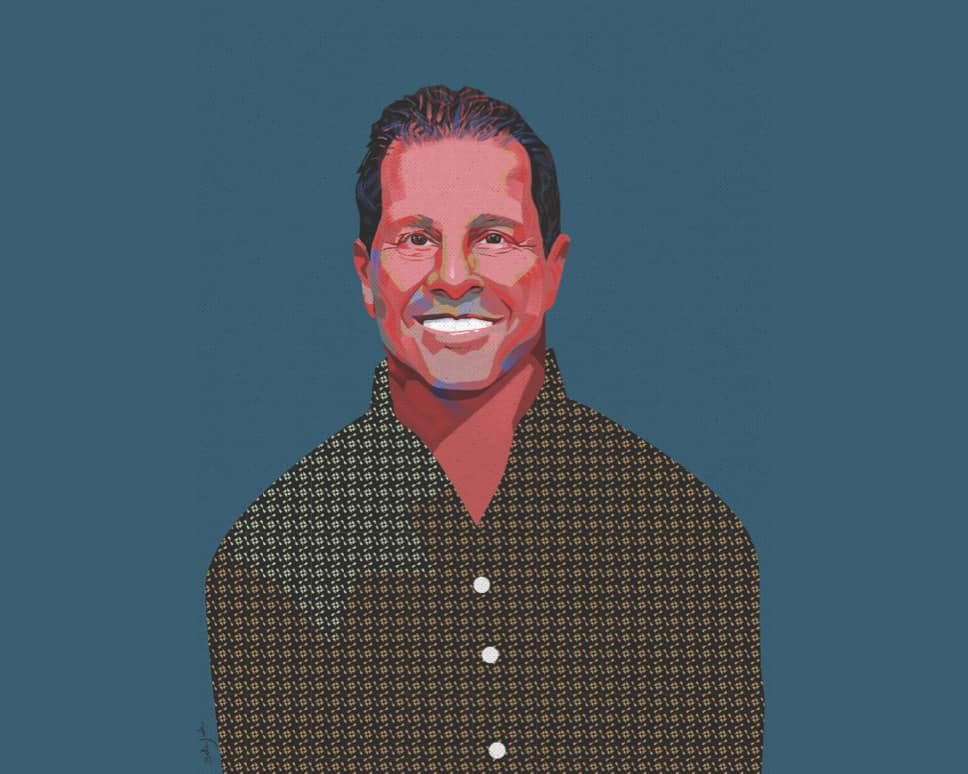
Even if you don’t know Jamie Salter, you surely know many of his iconic ABG brands. These include Sports Illustrated, Reebok, Marilyn Monroe, Elvis, Muhammad Ali, Shaquille O’Neal, David Beckham, Greg Norman, Eddie Bauer, Nautica, Izod, Lucky Brand, Nine West, Jones New York, Van Heusen, Arrow, Brooks Brothers, Barneys New York, Hickey Freeman, Hart Schaffner Marx, and many more highly recognizable names.
At a very youthful 59 (wearing a Muhammad Ali ‘Roots of Fight’ jacket and white Classic Leather Reeboks), ABG founder, chairman and CEO Jamie Salter looks more like a cool street kid than a hot shot exec. But make no mistake: this is a savvy and very shrewd entrepreneur who, in just over a decade, built a brand business that generates nearly $22 billion in annual sales. Known to dream big, risk big, and donate big to many worthy causes, Salter graciously shares with MR some success secrets.
“I’ve been buying and building branded companies since I was 17,” Salter begins. “I started out working with a large Canadian sporting goods company. I’d sell them stuff and they’d tell me that while my stuff was nice, they wanted more brands, better brands, bigger brands… So I went out and started buying brands, soon realizing it was a pretty good business: you buy a brand for x, you license it, and you collect royalties. With little formal training in finance, I’d make a deal that turned $30 million into $85 million, and thought that was pretty cool…”

Salter soon started doing business with Hilco, a major liquidator. “I asked the CEO, ‘What do you guys do with the brands you buy out of bankruptcy?’ He looked at me strangely and replied, ‘We don’t do anything with the brands: we sell off the inventory and it’s over…’ I asked him if he ever thought of adding value to the intellectual property. ‘It’s not worth anything,’ he told me, because back then, the banks valued inventory, receivables, and hard assets but never the brand name. That’s when I thought I might be on to something…”
Salter soon bought into the business; his first acquisition was the Halston brand. “We paid Jim Ammeen $22 million and we licensed it out. Then we bought Sharper Image, another homerun; then Polaroid, Bombay, Linens & Things, Caribbean Joe, Ellen Tracy… All of a sudden, we had lots of royalties coming in…
“The problem was that we had numerous investors for every deal: I had to go to 24 different Board meetings and was driving myself crazy. So I went to Hilco’s founder and CEO and suggested we roll all the companies into one, with one CFO, one CMO, and a team of brand managers to create a more efficient business model. I even offered to buy him out; a week later, I was fired.
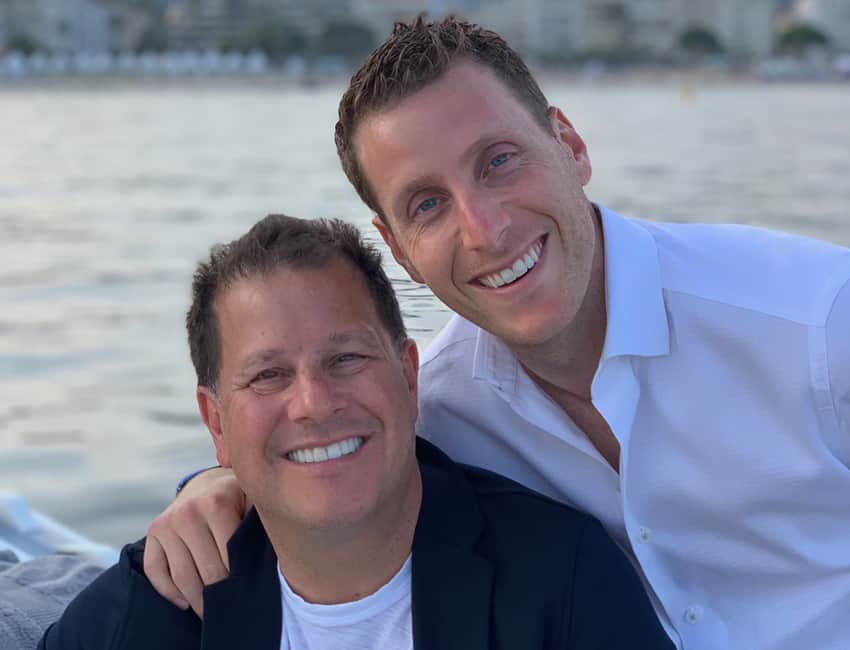
“It turned out to be the best thing that could have happened. I founded ABG in 2010 with my son Corey who was just graduating from Western University. We vowed that every brand we’d ever buy would be ‘authentic’ and global. In partnership with LGP (Leonard Green and Partners) who provided a $250 million line of credit, we started the company. We couldn’t ask for better private equity partners. From LGP, Black Rock, General Atlantic, and GIC to CVC and HPS, each has helped us get where we are today. I’m grateful to Jon Sokoloff, John Seiffer, and Usama Cortas for believing in our vision since the beginning. And to this day, 12 years and 36 transactions later, they remain our longtime partners and close confidants.”
Asked how ABG has succeeded with this licensing model when others have struggled, Salter affirms that it’s all about choosing the right partners. “You must select a best-in-class partner and set the tier of distribution parallel or higher than where it was when you bought it. (You can always come down, it’s much harder to go up…). I’ve also learned that limited distribution means more sales, as unlikely as that sounds. With fewer competitors in the market, retailers will back the higher-margin brand where they can make the most money.”
Although he could surely teach business school after so many years of hands-on dealmaking, Salter dropped out of college after three years. “I was having more fun working at my part-time jobs than going to classes. That said, I believe strongly in getting a good education, in learning the fundamentals in subjects like economics and law. School also teaches you organizational skills, which in my opinion is half the battle. Kids today think they’re too smart to write things down; why should they learn math or spelling when there are calculators and auto-correct? But I strongly believe in learning the basics.”

Clearly, Salter has learned from some wise mentors. “Although he’s no longer around, Jerry Sprackman, a wonderful man who was a big shot in Canadian real estate, taught me many fundamentals. He’d say, ‘Whatever you can finish today, you won’t have to do tomorrow. So don’t leave your office until you complete your to-do list. What you can’t finish today, put on top of your list for tomorrow. And make sure to write everything down in a daily planner.”
Michael Rubin from Fanatics is another powerful mentor. “I have enormous respect for Michael. He always reminds me, ‘Jamie, they’re just zeroes: don’t be afraid of the zeroes.’ Because when you’re doing big deals, it’s common to get freaked out by such big numbers. But Michael helped me understand that the big deals are essentially the same as the small ones. In fact, big deals often take less work because the operations around them are more sophisticated and go more smoothly.”
Salter cites David Simon, his current real estate partner, as another compelling mentor. “Tough as nails, David is the most respected guy in real estate today. He’s taught me that a deal is always a deal, a contract is a contract, so when you make it, you keep it. He also taught me the value of location: that in a mall, you want to be in the center. And the importance of diversified portfolios: don’t license out too much of a brand to one company: the more you license a la carte, the more stable and valuable the brand becomes.”

Asked which of his many brands is his favorite, Salter admits to loving Marilyn. “I loved her before, and I love her even more now.” A testament to her eternal relevance is the recent sale of Warhol’s iconic Marilyn painting for $195 million, which Salter regrets he didn’t bid on. We then discuss how well Kim Kardashian wore Marilyn’s famous “Happy Birthday Mr. President” gown to the Met Museum Gala, and how delighted Kim should be to have scored the cover of the recent Sports Illustrated swimsuit issue.
But while Andy, Marilyn, and Kim are trendy topics of conversation, Salter prefers to talk about his family. “To have all four of my boys (ages 25-33) in the business with me now is very special. I’ve always been a family man: despite my long hours, I made sure to spend weekends and vacations with my wife and kids. Of course, after 35 years, my wife Sheryl remains the center of my world, making it possible for me to do what I do every day. Although she doesn’t like the hours I put in, she accepts our roles and is clearly the heart and soul of the Salter family. I must say that my boys, while they don’t work as hard as I do, have figured out how to work smarter. And I’ve come to understand that a work-life balance is a good thing! The other good thing is that each of my sons has a different area of expertise—leadership, marketing, event planning, business development—so there’s minimal competition among them.”

Asked if it’s true that his mom (Eitta) sometimes shows up in the office, Jamie rolls his eyes and smiles. “Yes, she shows up. And she walks around the office sharing stories about how, when I was a baby, our family doctor (based on the way I played with blocks) diagnosed me with a learning disability and told her that while I have all 10 fingers and toes, I was unlikely to become a rocket scientist. She loves telling that story; everyone’s heard it multiple times! But I believe there’s an important message there: if you find your passion and work hard at it, you can be successful. Don’t ever let anyone dissuade you from chasing your dreams.”
Practicing what he preaches, Salter keeps pursuing his dream of becoming the biggest and best licensing company in the world. (ABG is now second only to Disney.) “It takes a combination of product, strategy, branding, marketing, and distribution. But it starts with product: if you don’t have that right, it doesn’t matter what you do with the rest. Years back, we made mistakes so now we’re incredibly careful when choosing partners. Early on, Nick Woodhouse, a former retailer, friend, and now partner in ABG, would say to me, ‘I wouldn’t buy that product from that manufacturer,’ and, I’d ask ‘So why are we licensing it to them?’ Or he’d say, ‘I wouldn’t buy from that store’ and I’d wonder, ‘So why are we selling to them?’ After a few mistakes, we learned how to choose the right partners. Today, we’ve got more than 1200 of them and a global default rate of less than 1 percent. Another lesson I learned from Nick is to go with the best partner, not the highest dollar. The best partner might not offer the biggest guarantee but will, over time, end up bringing more value and ultimately making more money. Nick also taught me not to be greedy: if you think you can sell 100 units, go after 95. You don’t have to get every nickel off the table. Starving the market often creates higher demand.”
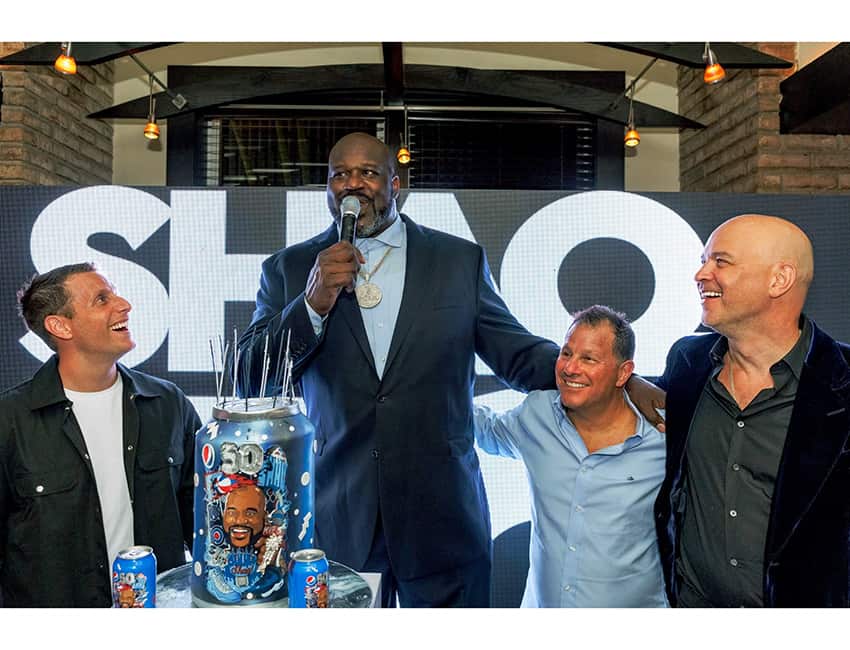
Asked how he assesses which brands to buy, Salter rattles off a list of prerequisites: it needs to be big (minimum $1 billion in retail sales) and global; it needs to be on sale for a good reason, and it needs “a strong heartbeat.” Case in point, he explains, is ABG’s recent $2.4 billion purchase of Reebok from Adidas. “Adidas learned a lot from owning Reebok: they bought it, studied it and copied it for years: if Reebok was in basketball, Adidas jumped into basketball; if Reebok was in hockey, same thing. Reebok was great for Adidas which is why they’re a mega-business today. I grew up with Reebok and knew we could pull everything out of the archives and just let Reebok be Reebok. We bought it in August ’21 and took control at the end of February; we’ve already seen a 20 percent lift, with 40 percent gains projected for the first 18 months…”
Going forward, Salter says ABG is focused on entertainment and lifestyle brands; they’re also looking into kids and animation. “While we won’t likely do another $2.4 billion deal in the immediate future, we’re always ready to pounce on good opportunities. Even a $10 billion deal wouldn’t scare me if we could get the numbers to work…”
As for his crystal ball on men’s business, Salter is optimistic. “Had you asked me in 2020, we were plenty nervous. The whole world was working from home and dressing casual; even Jarrod Weber (ABG’s fashion-savvy Group President Lifestyle, Chief Brand Officer) would come to work wearing drawstring pants and we thought the tailored clothing business was over. But we had a hunch that people would eventually go back to the office and back to live events and when that happened, they’d want to look their best. I had lots of talks with Alex Dillard, a great retail partner, who assured me that he’d seen this before and that tailored would come back strong. I asked if he was sure: I mean we were about to buy Brooks Brothers… And he pointed out that it was and still is one of the best men’s brands out there and we were buying it for a fraction of what we would have paid the year before. He advised me to develop the sportswear, maybe balancing it 50/50 with tailored. (If you look at Dillards’ numbers, they’re absolutely crushing it in tailored clothing!)”
So despite much pandemic uncertainty, Salter took some big risks. “We decided that if Covid was going to end the world, we’d be out of business anyway, so we might as well go all in. So we bought several big brands over the past 12 months: Reebok, Lucky, Izod, Van Heusen, Arrow, Geoffrey Beene, Brooks Brothers, Eddie Bauer, David Beckham… These were calculated risks that turned out well. Brooks Brothers is up 60 percent year over year and Lucky is up 53 percent. We’re definitely getting some big wins. But we’re feeling a little pressure with younger shoppers; Aeropostale and Forever 21, for example, are facing some challenges. But minor ones!”
Ever the optimist, Salter’s energy and intuition will surely serve him well as ABG prepares to file an IPO in the next year or two. Confirms Jarrod Weber, “Working for Jamie, a brilliant deal-maker who can outthink anyone, you know you’re going to win.”
The MR Awards is the largest and most prestigious event on the better menswear calendar, attended by the industry’s leading retailers, brands, and menswear insiders. In addition to new honorees, more than 50 Lifetime Achievement and Hall of Fame members are invited to return each year. The awards will be held at the Edison Ballroom on Sunday, July 17th, 2022, during New York menswear market week.



